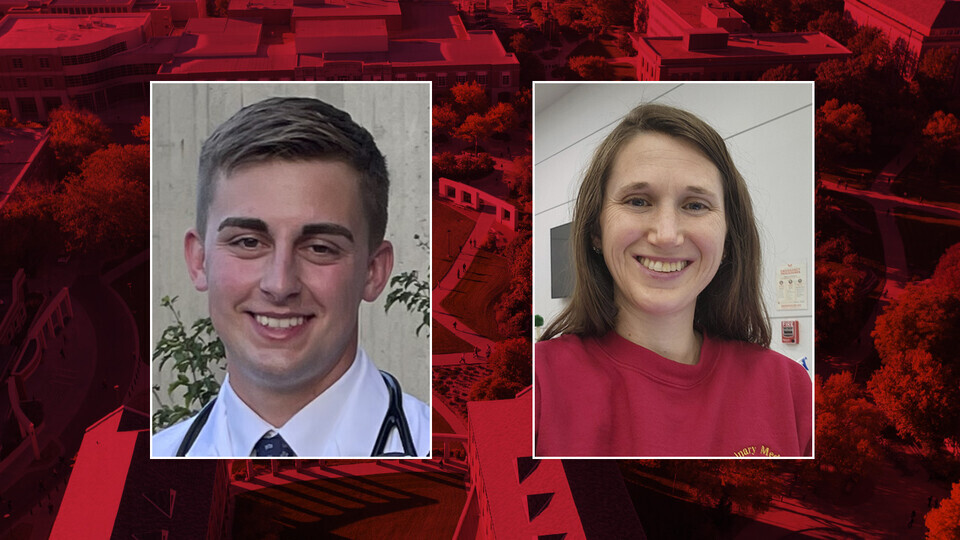
Lincoln, Neb. —A university can often serve students best by getting creative in structuring its academic programs. Two aspiring veterinary medicine students graduating May 20 from the University of Nebraska–Lincoln have found that in the university’s Veterinary Medicine 3+2 program.
Because an undergraduate degree is not required for admission to many veterinary schools, the 3+2 program enables Nebraska students majoring in animal science or veterinary science to begin veterinary school, if accepted, after their junior year. Once they complete their first two years of veterinary school coursework, those classes, with approval of their major adviser, can then be applied to their animal science or veterinary science major, fulfilling the requirements for their bachelor’s degree.
The two students graduating this spring — Nebraska natives Tucker Randall and Niki Rice — say the 3+2 approach has done an excellent job in meeting their different personal circumstances. Randall has pursued vet school along a traditional academic path, while Rice resumed her academic studies several years ago after an interlude to start her family. The mother of a 9-year-old son, she has balanced family duties with her academic work, which has included a research project on canine nutrition.
“I’ve been very grateful for the entire program,” said Rice, a native of Hershey, Nebraska, who majored in veterinary science.
Her family moved to York, Nebraska, so she could commute to the university and complete her prerequisites for veterinary study. By enabling vet school entry after three years of undergraduate study, the 3+2 program “really accelerates the process for people in my situation,” she said.
Randall and Rice are wrapping up their first two years of the Professional Program in Veterinary Medicine, a cooperative agreement between Nebraska’s School of Veterinary Medicine and Biomedical Sciences and the Iowa State University College of Veterinary Medicine. Participating students complete their first two years of veterinary study at Nebraska U and then transfer to ISU for the final two years of veterinary school. Through this cooperative program, which is exclusively for residents of Nebraska, PPVM students pay in-state tuition during their study at ISU.
Students with an interest in veterinary study benefit greatly from the PPVM’s smaller class sizes and the quality of the professors, Rice said. Starting with their first semester, students pursuing veterinary studies have many opportunities to interact with animals and participate in other hands-on learning activities inside and outside the classroom.
Randall, a Ceresco, Nebraska, native, was energetic as an undergraduate in pursuing opportunities in veterinary settings and developing his leadership skills. An animal science major, he worked part-time at a vet clinic in Lincoln and in the Nebraska Veterinary Diagnostic Center on East Campus. He was elected Senate president of his residence hall and took an active role in the Pre-Vet Club, serving on its executive team. This year, he was named a Chancellor’s Scholar.
The Animal Science program had great value for him, he said, by giving him a strong academic foundation and providing a range of hands-on experiences in veterinary studies. That combination of experiences, plus his work at a Lincoln veterinary clinic, “helped me tremendously,” he said.
“Learning day by day what the field encompasses was a big help for me, to make sure that this is something I really want to pursue.”
Randall and Rice both have had rewarding experiences with horses. In the spring of 2020, during his third semester of college, Randall participated in an internship at the Hagyard Equine Medical Institute in Lexington, Kentucky. There, he had the opportunity to work with world-renowned racehorses, assisting with duties including C-sections and caring for newborn foals in the ICU.
The experience “was a huge help for me,” Randall said. The internship introduced him to leading veterinarians in the equine community and was a major plus when he applied for vet school. He aims to include equine treatment as part of his future practice.
Rice’s equine experience came while working at the Morning Star Adaptive Riding Center in Hickman, Nebraska. The center provides adaptive riding and equine therapy for children and adults with physical, intellectual or emotional needs who may not otherwise have the opportunity to work with horses.
“I got to be trained to lead the horse and to work with patients of all different disabilities and ages,” Rice said. “It was very enlightening and a new opportunity for me. I made some very good friends through that program.”
Rice is looking confidently toward the future, buoyed by the strength of her academic studies at Nebraska as both an undergraduate and veterinary student.
“I think we’re prepared very, very well compared to the classmates we’re about ready to join,” she said.
For questions, contact Wendy O’Connor, pre-vet adviser in the College of Agricultural Sciences and Natural Resources, at 402-472-6040 or woconnor1@unl.edu.







